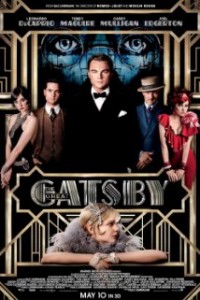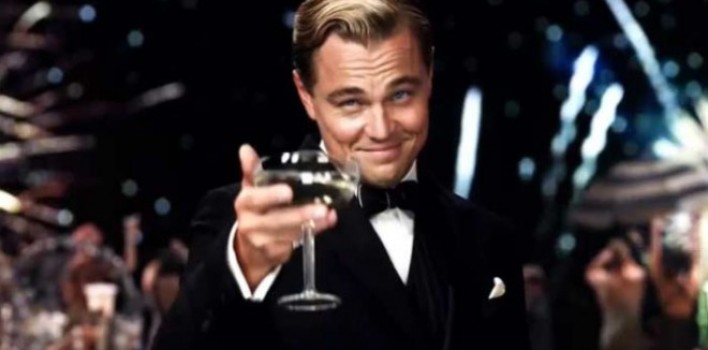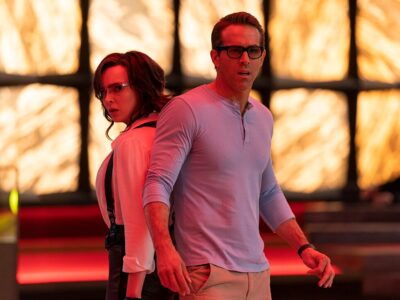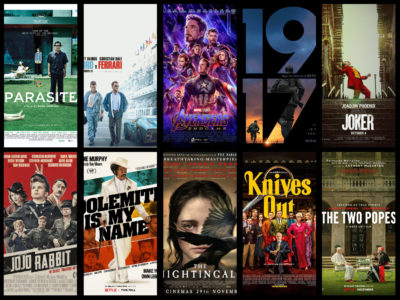How Great Was Gatsby?
Directed By Baz Luhrmann
Rated PG-13
Nick Carraway: “New York, 1922, the tempo of the city had changed sharply. The buildings were higher. The parties were bigger. The morals were looser and the liquor was cheaper. The restlessness approached. Hysteria.”
 The trouble with making a Great Gatsby movie is that it has been done before — and not just once. It is even more trouble when you are trying to adapt a piece of literature that has been regarded as a Great American Novel. Though there are some people who surely enjoyed it, an earlier interpretation, which included a young Robert Redford and Mia Farrow, didn’t seem to really “wow” audiences, so the odds of anyone being able to tell this tale on the big screen to satisfaction would be slim. This is exactly the challenge that director, Baz Luhrmann (Romeo & Juliet, Moulin Rouge), had his sights set. Bringing his visually brilliant style to a movie that was almost written for it, with the lavish lifestyles and parties of the wealthy in the 1920’s, Luhrmann gives the audience a visual to pair with what they could have only imagined before. The scenes in this movie are so meticulously put together that a viewer could not help but see how the character, Jay Gatsby, had spared no expense in creating the fantastical persona of the “Great Gatsby”. It is only further brought to life by Leonardo DiCaprio, who falls easily into the role of the enigmatic title character. While there will always be those who are not happy with anything but the book, Luhrmann’s interpretation gives you all you could hope for in an on-screen adaptation, including a story filled with intrigue, heartache, and lots of moral ambiguity.
The trouble with making a Great Gatsby movie is that it has been done before — and not just once. It is even more trouble when you are trying to adapt a piece of literature that has been regarded as a Great American Novel. Though there are some people who surely enjoyed it, an earlier interpretation, which included a young Robert Redford and Mia Farrow, didn’t seem to really “wow” audiences, so the odds of anyone being able to tell this tale on the big screen to satisfaction would be slim. This is exactly the challenge that director, Baz Luhrmann (Romeo & Juliet, Moulin Rouge), had his sights set. Bringing his visually brilliant style to a movie that was almost written for it, with the lavish lifestyles and parties of the wealthy in the 1920’s, Luhrmann gives the audience a visual to pair with what they could have only imagined before. The scenes in this movie are so meticulously put together that a viewer could not help but see how the character, Jay Gatsby, had spared no expense in creating the fantastical persona of the “Great Gatsby”. It is only further brought to life by Leonardo DiCaprio, who falls easily into the role of the enigmatic title character. While there will always be those who are not happy with anything but the book, Luhrmann’s interpretation gives you all you could hope for in an on-screen adaptation, including a story filled with intrigue, heartache, and lots of moral ambiguity.
That is where we start; moral ambiguity. It would be easy to write this film off because it engages the audience to the point where the lines between protagonist and antagonist are blurred. One would think that Gatsby is the protagonist of the story, being the title character, and, to be honest, he is someone that you find yourself rooting for most of the movie. His desire to “win” Daisy and reclaim lost love seems admirable and worthy — but we find that in doing so he is destroying a marriage (albeit a destructive one). So, in the end, Gatsby is taking something that does not belong to him and even when he gets what it seems he wants, he is not satisfied until his pride and past are satiated. Nick Carraway seems to be a protagonist of sorts, but is more of an objective observer than actual player in the story. If anything Nick becomes a means to an end who eventually turns to holding Gatsby, faults and all, up on a pedestal Daisy, though seemingly innocent, makes decision after decision based on her own temporary happiness at any given moment trying to make everyone and no one happy at the same time. I could even mention Tom Buchanan, who eventually reveals the truth of Gatsby’s charade — but I think I would be hard pressed to convince anyone of his virtue in any other light.
As a Christian, it would be easy to see this cast of characters and dismiss the movie totally. It seems to support infidelity, takes the sacrement of marriage as an inconvenient joke, dances all around the morality of self-fulfillment, and rarely do we see someone take what would be considered the “right or honest” path. I would argue that the dismissal would be heinous. This is life — ugly, shameful, selfish, and wrought with people having to make choices that have real consequences. The story doesn’t even leave us with the happy ending we would all wish to see. But that is life, it’s not perfect. I think instead of saying, “I can’t support a film that seems to support infidelity.”, asking, “What drives Gatsby to not only do, but justify the things he does?”
Jay Gatsby: “I will tell you God’s truth, God’s truth about myself. I am the son of some very wealthy people. Sadly they’re all dead now. I’ve lived in all the capitals of Europe collecting jewels, hunting big game, painting a little. Then came the war, old sport. Every allied government gave me a decoration.”
When we are finally introduced to Jay Gatsby, he already has so many different back stories full of tall-tales that it is hard to believe one person could have fit so much into one lifetime. Sure enough, we find that Gatsby’s entire life is one long lie — a lie we want to find noble because it is all for a love lost. It’s a love that was not supposed to be possible due to the great differences in social status that Gatsby and Daisy possessed. It keeps them apart and becomes Gatsby’s single focus. He even remarks at one point in the movie that he “…knew it was a great mistake for a man like me to fall in love.” We find Gatsby passionate, driven, determined, unflinching at any opportunity to get what he wants. Jeremiah 17 warns that “the heart is deceitful above all things, and desperately sick…” Gatsby’s heart has this sickness.
Nick Carraway: “You can’t repeat the past.”
Jay Gatsby: “Can’t repeat the past? Why, of course you can. My life, my life has got to be like this. It’s got to keep going up.”
Nick Carraway lauds Gatsby for having an “extraordinary gift of hope,” but does not seem to laud the things that Gatsby has hope in. He questions Gatsby’s attempts at trying to repeat or recreate the past. We will never know how the story would have turned out if it was possible for Gatsby to be satisfied with knowing that Daisy did still love him. He had to try to take it a step further — a step that cannot be taken. His hope was in the idea that if Daisy admitted that she never loved her husband, then it would allow him to justify the past five years — rewrite them somehow. Daisy, of course, could not admit that she had never loved her husband, and could not join Gatsby in his blind hopefulness.
Daisy Buchanan: “All the bright precious things fade so fast and they don’t come back.”
“Therefore, if anyone is in Christ, that person is a new creation. The old has gone, the new is here!” -2 Corinthians 5:17 (NIV)
Gatsby is a story that can be a testament to what happens when opportunities arise or talent abounds and someone is unwilling to let go of the past and keep their focus on things that are lasting. The Christian life is full of hopefulness, faith and rebirth. But it’s after that rebirth that we must not cling to the things in our old life and let them dictate our new life. Gatsby found love and then lost it. He was given the giftings and fortune to better his circumstances from that of his birth, but he squandered them all by trying to rewrite five years of his life. Gatsby turned a good thing into an ultimate thing — a thing that he measured every gain and success in his life by. We all have regrets, we all have things we wish we could do over, but we are ultimately encouraged that we are a new creation and if we keep our focus on things eternal, God can be great through us.
Jay Gatsby: “I didn’t want you to think I was just some nobody.”







